- Home
- Scott Turow
The Burden of Proof kc-2 Page 12
The Burden of Proof kc-2 Read online
Page 12
Kate looked at him uncomprehendingly. Even in sandals, she was an inch or two taller than he, dark and beautiful, with her straight hair and perfect features.
"Recently?"
"Within the last few months."
"No. Of course not. I told you, she had no idea."
"But perhaps-is there no way your mother might have received the bill for one of your tests, some procedure?"
"Daddy, what in the world?" Kate had stepped back from the sink. She remained tense and emotional at any mention of Clara, and he suddenly thought better of going on. She had provided a sufficient answer.
He touched her on the shoulder to soothe her and stepped into the family room, still furnished with boxes and card chairs, and joined John, who had gone straight to the TV set upon reentering the house. At these instants Stern found himself full of almost religious ratitude for the invention of television sports, which could occupy the few moments he felt obliged to pass with his son-in-law.
Tonight, the Trappers, the tri-cities' traditionally woeful big-league baseball team, were on the air, and Stern and John swapped thoughts about the prospects for the season just under way. The story with the Trappers was always the same: young stars traded away when their salaries increased, pitchers who hit it big as soon as they escaped the Trappers' pocket-sized park. Stern, who had made baseball one of his most passionate studies in learning the American way of life, enjoyed his son-in-law's insights.
John had an athlete's eye for the nuances of physical performance: the shortstop threw off-balance. Tenack, the magnificent right fielder, was trying, as he did each April, to upper-cut the ball. Wearing glasses for his TV viewing, John poked his frames back up on his nose from time to time as the images of the green field floated on his lenses. He appeared transfixed, childlike, still bound heart and soul by the grace and glory of the fields of play; when John watched, you could almost hear the hot roar of the stadium crowd in his ears.
Long moments passed while Stern awaited John's occasional observations, to which he could add some knowing comment of his own. Stern rarely asked John about work; it had become clear long ago that he would never answer honestly, fearing that his responses, which were likely to verge on complaint, would find their way to Dixon. John had had a slow start at MD, passing bewilderedly through the accounting and compliance departments before finding a home on the order desk, where, Stern took it, his performance was still not stellar. They sat on either side of the glowing screen, John's zombie-like attention to the game undoubtedly increased due to the presence of his father-inlaw, while Stern recalled similar dumbstruck reactions, at the same period in his life, to his own imposing father-inlaw, Henry Mittler. In these reflections, he felt for John, especially since at heart Stern always remained half ready to revile him for not being better, smarter, more adept, more able to rouse in Kate something laudable, rather than, as it seemed, allowing her to drift to rest on the soft seabed of the commonplace.
A sufficient time passed to suit all proprieties, he bade John good night and, ready to be on his way, found Kate in the kitchen. Seeing her, though, it occurred to him once more how vexed his last exchange with her had left him. If the bill from Westlab was not for Kate, then what? He was back to point zero.
"Katy," he said, releasing her from his parting embrace, "are you quite sure there was no bill for you that might have come to your mother?"
"Daddy, there is no way. What's wrong with you?" She looked at him, incredulous, and he shrugged, somewhat defensively.
It had seemed so obvious, so characteristic of Clara that the children were involved.
With the next thought, Stern, halfway across the kitchen, stood absolutely still.
He knew now.
He had blundered past it. But he knew now why Clara had received no doctor's bill; why Peter had been so orerwrought that day about the prospect of an autopsy.
Because it was he, Stern's son, who was the physician, Peter who had ordered the lab test, and Peter who remained, even now, resolved to honor some prior commitment of confidence he had made to his mother.
Stern understood the need to maintain professional secrets, but he could not help suspecting that his son would enjoy this advantage over his father, having exclusive hold, in the end, of one last scrap of her life. Might the others know as well?
"Katy." She was facing him, her attention evidently drawn by her father's abstracted look. "Do you know anything of your mother receiving medical care from Peter?"
"What?" Her mouth had fallen open a bit and her face was rigid with alarm. She obviously took the suggestion as baroque. The question that rose in her eyes was easily discemed: Was her father derailed, off his trolley, losing hold? She looked gravely concerned that these ideas, wildand improbable, were coming from him, one after another.
Was he wrong? The kitchen light seemed suddenly intense.
For the first time in his life, he felt a sensation of dislocation, which he knes way, found Kate in the kitchen. Seeing her, though, it occurred to him once more how vexed his last exchange with her had left him. If the bill from Westlab was not for Kate, then what? He was back to point zero.
"Katy," he said, releasing her from his parting embrace, "are you quite sure there was no bill for you that might have come to your mother?"
"Daddy, there is no way. What's wrong with you?" She looked at him, incredulous, and he shrugged, somewhat defensively.
It had seemed so obvious, so characteristic of Clara that the children were involved.
With the next thought, Stern, halfway across the kitchen, stood absolutely still.
He knew now.
He had blundered past it. But he knew now why Clara had received no doctor's bill; why Peter had been so orerwrought that day about the prospect of an autopsy.
Because it was he, Stern's son, who was the physician, Peter who had ordered the lab test, and Peter who remained, even now, resolved to honor some prior commitment of confidence he had made to his mother.
Stern understood the need to maintain professional secrets, but he could not help suspecting that his son would enjoy this advantage over his father, having exclusive hold, in the end, of one last scrap of her life. Might the others know as well?
"Katy." She was facing him, her attention evidently drawn by her father's abstracted look. "Do you know anything of your mother receiving medical care from Peter?"
"What?" Her mouth had fallen open a bit and her face was rigid with alarm. She obviously took the suggestion as baroque. The question that rose in her eyes was easily discemed: Was her father derailed, off his trolley, losing hold? She looked gravely concerned that these ideas, wildand improbable, were coming from him, one after another.
Was he wrong? The kitchen light seemed suddenly intense.
For the first time in his life, he felt a sensation of dislocation, which he knew, instinctively, was typical of the elderly. Kate was correct. Given over to his preoccupations, he had lost his bearings.
What had happened to his lifelong habits of caution, tact, discretion?
He could not simply mn with this knuckleheaded notion and confront his son. If Peter was wrongly accused by his father of even the most wellzintenfioned manipulations, his predictable response would be outrage; the reverberations would shake what little family structure remained. He would have to hunt down Nate Cawley once again and ask him to make inquiries at the lab. That was the best and most discreet alternative.
"An idle thought," he said to Kate. "Allow it to pass." He took his daughter's hand and kissed her on the temple. He thanked her for dinner and waved off her inquiries about whether he was all right. But he found himself increasingly irritated as he walked into the mild night.
Driving along the highway in his Cadillac-this was his car, a Sedan de Ville;
Clara's had been towed away by the dealer in part of that procession of changing scenes and backdrops at the time of her death which he recalled now like a cinema montage-he felt the same rise of difficult emotion.
He was tiring of Clara's gruesome surprises, her hidden world, with enormous sums expended and secret illnesses. In his confusion, he had now even begun to suspect his children. This was her fault, Stern thought suddenly, her fault! The declaration almost rang in him.
Still in this mood, he stopped near home at a convenience store. Certain household tasks remained beyond him. Claudia called in his grocery list from the office and the store obligingly delivered the bags to the back door. But there were always items missing: cream cheese, milk. He never had enough orange juice. Waiting in line, he observed with admiration two young black women who were ahead of him, in halter tops despite the chill of spring, talking high-speed bebop slang, disarmingly casual With their obvious sexuality. He felt again the high-voltage transmissions of sensual energy. What was all this? he wondered. Signs of life, he told himself; natural, he thought, but there was something wild and unpredictable in this urgency. He was so deeply stimulated by virtually any female. Was it some racist conceit to think that he would be as strange as some Martian to these women? He imagined, nonetheless.
What really was the look and feel of those heavy brown breasts, smooth-skinned, heavy-nippled? His imagination rushed on to these thoughts. He stood unmoving in the store, his mouth slightly agape, aroused.
Back in the parking lot, he sat in the car, a bit shocked at himself.
How could he really? You would think, observing his adolescent eagerness, that he'd had no passionate life with Clara, which was not true. As a young man he had craved her more, in fact, after they were married than before, when so much else seemed to be involvedi and even as age and time had tempered the pulse of things, that hunger had never been wholly lost. A man and a woman in the end were always that to each other, opposites and mysterious, and in the act, with its joining and exploring, things more magical and solemn than the most ancient ritual forever resided. Certain other couples, his age and older, made allusions to the extinction of these impulses. Dick Harrison, a neighbor, remarked to Stern one night, 'I hold it up, the sunlight passes through." But three or four times a month Clara and he struck this fundamental compact-creaky, lumpy old bodies as she said, moving toward each other across the bed and, as ten thousand times before, melting together. Lately, he had tried to recall the last occasion and found, almost certainly, that it had been more than a month 'before her death. One more sign of what he should have noticed. But he was on trial, fraught and distracted, and who after the years does not know better than to foment small crises? They move apart and then rejoin.
The image is of some X-ray shadow, a form in negative space; opening and breathing, closing, clinging, like the wings of a moth in the dark, the walls of the heart.
Now that same woman had turned him loose in late-century America, where standards for sexual performance were touted on the covers of the magazines sold at the checkout stand right there behind the broad store window. Was he prepared for this? The uncomfortable truth was that he had no past to brag about, no comforting memory of the wild oats sown by young Alejandro Stern. Geography, as he thought of it, had been against him. Argentin. a, with its gauchos and machos and so forth, probably would have been a more propitious place to pass his adolescence. Male, lust was better accepted there, a legacy of the nation's Italian and Spanish forebears. His brother, even at the age of fifteen and sixteen, was an impressive roue. He had many women, or at least claimed to: whores, Indian girls, older women lusting for youthful energy. Stern could still clearly recollect listening awestruck to Jacobo's account of his initiation, at the age of thirteen, with a very thin young woman attired in a black strapless evening gown, who had met him in the lobby of the Roma, a seedy downtown hotel in B.A. Months later, Jacobo contended he recognized her on the sweet in a habit, walking with her sunken eyes, amid a row of novices leaving the Convent of Santa Margarita.
Stern, forty-five years after the fact, found the thought of this woman as imagined, with her sunken eyes and small breasts, disturbingly provocative.
But his youth in America in the fifties had contained nothing so exotic.
The Puritans reigned once more here, and sexuality seemed to be a particularly unbecoming trait for a dark foreigner, a suspect impulse like fellow traveling.
Lust was one more wild hunger that he willingly constrained for future satisfaction, even with Clara, with whom he would not have slept before their wedding but for her insistence that they were more likely to enjoy the honeymoon if they could leave this particular anxiety behind. And so, two weeks before the ceremony, in Pauline Mitfier's parlor full of Oriental brocades and Viennese glass, with all the lights still burning for fear that someone in the house might notice, Clara had wriggled from her girdle and her hose, lifted her skirt, and lain back on her mother's red divan. For many reasons, that had struck Stern as an act of astonishing trust. And he? He was terrified and, because of that, also somewhat affronted, angered by the indignity 'of these shabby mechanics.
Thirty-one years later, those emotions remained real to him, near at hand in the dark auto, the peculiar residue of a night of high feeling in which he had been confused and stimulated and put out. But he had proceeded; he remembered that as well. He had fiddled interminably to release his erect penis from the bindings of his trousers, and Clara Mittlet had become the first-the only-woman in his life.
Stern had first seen Chicago when he was thirteen, near the end of the overland passage his mother and Silvia and he had made from Argentina.
That journey had been impelled by his mother's involvement with a man named Gmengehl, a lawyer who had been showing her great interest since, it seemed, the moment of his father's death. Gruengehl was a figure in one of the few anti-Peronist unions, and following his jailing, his friends and colleagues had swept into his mother's house to help them pack, their mute for exile already arranged. In 1947, with displaced persons throughout Europe claretring for entry to the United States, and Argentina's diplomatic ties to the U.S. questionable after the war, legal immigration was problematic. Instead, they traveled by train to Mexico City, and then were driven across the border, looking like one more family of braceros. In Brownsville they boarded a train North.
Stern even so young, had known that Argentina was not his destiny. His father, a physician, had left Germany in 1928 and forever mourned that the Nazis prevented his return.
Papa always unfavorably compared life in Argentina to what he had known before: the quality of goods, of music, of building materials, of people was sadly lacking in his eyes. Jacobo, whom Stern so admired, had become an ardent Zionist and preached from the time Stern was nine or so the glory of Eretz Israel. When Stern stepped off the train in Chicago, he believed his life had started. They went on to Kindle County, where cousins of his father's were waiting, but Chicago would always be what he thought of as America, with its massive, soot-smeared buildings of brick and stone and granite, full of smokestack arms and sullen, teeming throngs, the land of Gary Cooper, of steel, skyscrapers, automobiles. He recognized in every face that day the striving.children of immigrants.
More than four decades later, Mr. Alejandro Stern returned, a man of prominence with his own troubles. On the fifth floor of the Chicago Exchange, he sat in the walnut conference room at Maison Dixon, thumbing through documents he could not comprehend. Outside, the vast trading room of MD burned on, eighty young men and women, casually dressed, each behind a telephone console blinking with the action on twenty lines, and a pillar of cathode-ray tubes. Across these glowing screens darted figures, flashing by briefly like fish in the sea, a matrix of dollars and cents, beans and oil, fast markets and bulletin items, high, low, open, volume, change. The telephones chirped like crickets, and different voices occasionally gained ascendance. "Anybody here want to buy old bonds at 6 plus?… It's moving, it's moving."
"I'm going to hedge you up on the D-marks."
Between calls, these young people, working customer and managed accounts, would offer to the entire room a hip, sardonic commen
tary. One fellow whined in a mock accent of some kind, "Oh, the market, she is just like a woo-man, first she wants you, then she don't, she won't never make up her mind." An attractive young blonde beside him inclined her middle finger in response.
"Got it all figured out?" Margy Allison, Dixon's chief operating officer, had returned for a moment to check on his progress. She had been in this business most of her adult life, almost exclusively for Maison Dixon, and, apparently, still found it thrilling. Nothin' to it, she seemed to suggest, as she motioned to the stacks of paper around Stern-even a silly old Okie gal could git it. Margy loved to do routines like that, for the amusement of her friends up North. An M.B.A., she preferred to come on like an oilfield roughneck. 'Mar-gee,' she would say, when introducing herself. 'Hard g. Hard girl."
"I believe we shall need an accountant," Stern told her.
Margy made a face. She was the paymaster in these parts and a legend for her tightfistedness. Every time she signed a check, she told you what a dollar used to buy in the country.
"I can put all that stuff together for you."
She was capable, no question, but unlikely to find the time. With the advent of overseas trading, and night sessions of the markets, Maison Dixon was open twenty-four hours a day, and there were problems to solve at every juncture. At her door at any hour, there was usually a line: clerks and secretaries and boys up from the floor in the unstructured jackets with the large square plastic badges on the pockets. Stern, accordingly, told her she could not afford to spend the hours this job would require.
"If you're billin' us your usual hourly rate, Sandy, I can afford a lotta time." She smiled, but her point, of course, was made. "I'm sure you got one of those hotel rooms like you usually do when we're payin, big enough to hold the opera with the elephants. We can take this whole mess there and look it over. Assumin a' course"-Margy hooded her shadowed eyes-"you're willing to chance bein alone with me." She cast herself in a vampy role, a female sexual braggart. It was part of her 1ov routine, coming on tough and crude, like the kind of woman you imagined finding smoking a cigarette at the bar of some mid-city lounge.

 Testimony
Testimony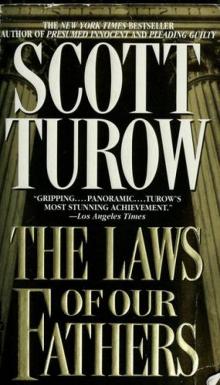 The Laws of Our Fathers
The Laws of Our Fathers Ordinary Heroes
Ordinary Heroes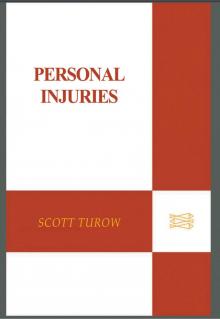 Personal Injuries
Personal Injuries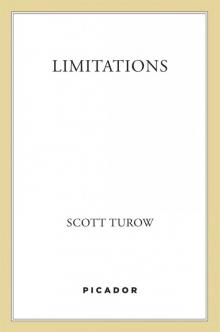 Limitations
Limitations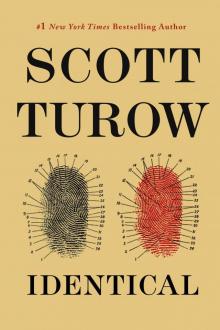 Identical
Identical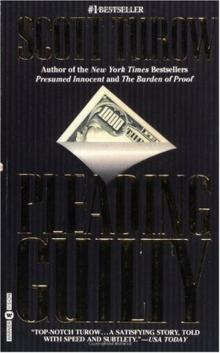 Pleading Guilty
Pleading Guilty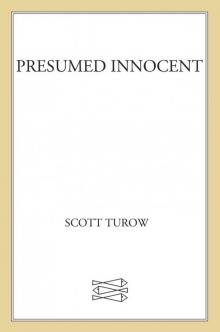 Presumed Innocent
Presumed Innocent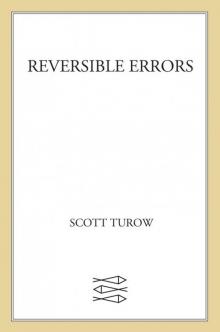 Reversible Errors
Reversible Errors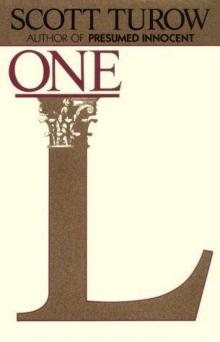 One L: The Turbulent True Story of a First Year at Harvard Law School
One L: The Turbulent True Story of a First Year at Harvard Law School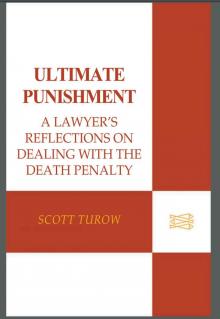 Ultimate Punishment
Ultimate Punishment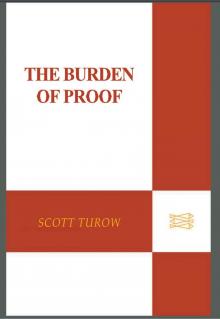 The Burden of Proof
The Burden of Proof Ordinary Heroes (2005)
Ordinary Heroes (2005)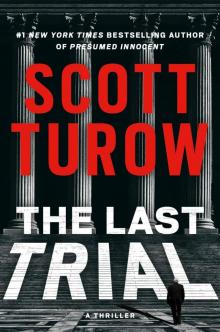 The Last Trial
The Last Trial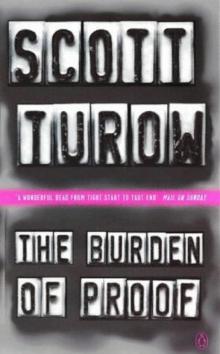 The Burden of Proof kc-2
The Burden of Proof kc-2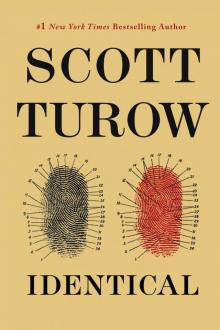 KC09 - Identical
KC09 - Identical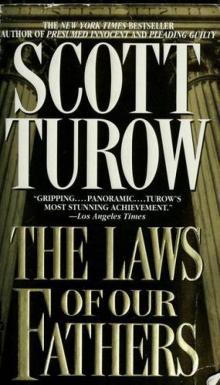 The Laws of our Fathers kc-4
The Laws of our Fathers kc-4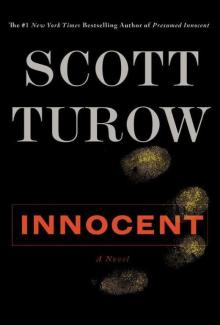 Innocent kc-8
Innocent kc-8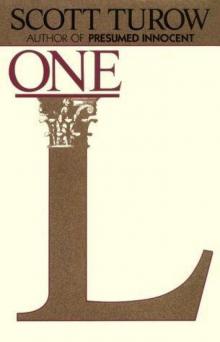 One L
One L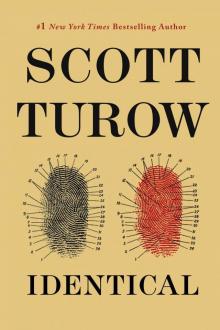 Identical kc-9
Identical kc-9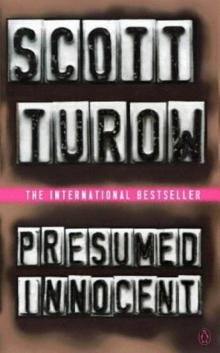 Presumed innocent kc-1
Presumed innocent kc-1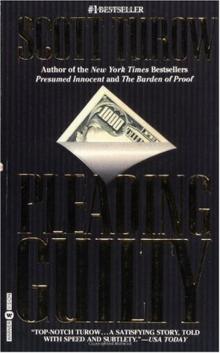 Pleading Guilty kc-3
Pleading Guilty kc-3 One L (1977)
One L (1977)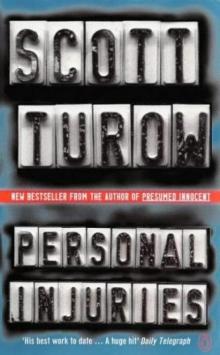 Personal injuries kc-5
Personal injuries kc-5